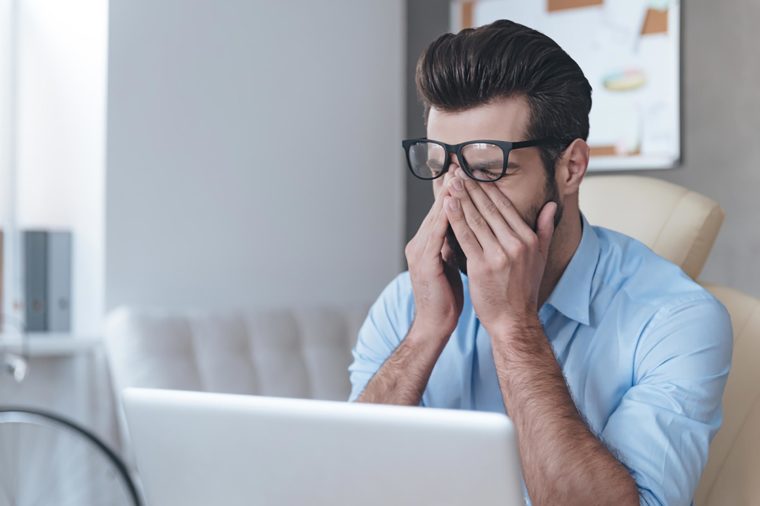Why do you have tired eyes at the end of a long workday? You are actually exercising what ophthalmologist James P. McCulley of the University of Texas Medical School calls “among the most active muscles in the body.” (Make sure you’re aware of these medical reasons you’re tired all the time.)
1. Computer work and reading requires more muscles.
Your eyes contain three sets of muscle groups. Concentrated reading or close work provides a workout for these muscle groups strenuous enough to make Richard Simmons proud. Unfortunately, as in all aerobic programs, the saying “no pain, no gain” applies, as Winnipeg, Manitoba, optometrist Steven Mintz explains:
The human eye is designed so that, if perfectly formed, it will form a clear image on the retina (at the back of the eye) of any distant object without having to use any of the muscles. In order to see closer objects clearly, however, each set of muscles has to work. The extraocular muscles must turn each eye inward; the sphincter muscles must work to make the pupil smaller; and the ciliary muscles must contract to allow the lens to change to a shape that will produce a clearer image.
Solution: To help your tired eyes, try focusing on a distant object to immediately feel your eyes relax.
Computer Vision Syndrome is a real thing, and it could be seriously affecting your productivity.

2. Your eyes are imperfect.
This minimal muscular effort is significant in itself. However, no human eye is perfectly formed and these imperfections will increase the amount of effort required. For instance, people who are farsighted must exert more than the normal amount of effort on the part of the ciliary muscles. Many people have extraocular muscle imbalances that force them to work harder. Virtually every person, as [he or she] approaches or passes the age of forty, suffers from a stiffening of the lens inside the eye, which forces those ciliary muscles to work even harder.
Solution: Visit your eye doctor regularly to get a proper prescription for your vision. Find out the things your eye doctor won’t tell you.
3. The lighting is bad.
Reading under poor light (either too much or too little) will cause the sphincter and dilatory muscles to work excessively.
Solution: To help your tired eyes try playing with the lighting to find a level that’s comfortable for you.
4. You’re overworking them.
Just like doing 100 push-ups can cause the arm muscles to become pain[ed], so can the muscular effort … described above cause sore eyes. Add to this that after several hours of close work, all of your body’s muscles are going to be more fatigued, your level of tolerance or your pain threshold for sore eyes will be less than when you are fresh. While most of us are more than happy to rest our muscles after doing a few push-ups, we expose our eyes to a marathon just about every day.
Solution: Don’t check your Facebook page when you get home. Take some time to relax your tired eyes. Try these vision boosters to improve your eyesight.

5. Close work also slows down the blink rate, causing dry eyes.
Ophthalmologists we consulted speculated that much of the eyestrain attributed to tiredness is in reality caused by dryness. Dr. Ronald Schachar of the Association for the Advancement of Ophthalmology notes that when one is tired, the blink rate slows down and the eyes are not properly lubricated. Eye specialists are finding that workers at computer visual display terminals experience decreased blinking.
Solution: Step away from your computer at least once an hour.












